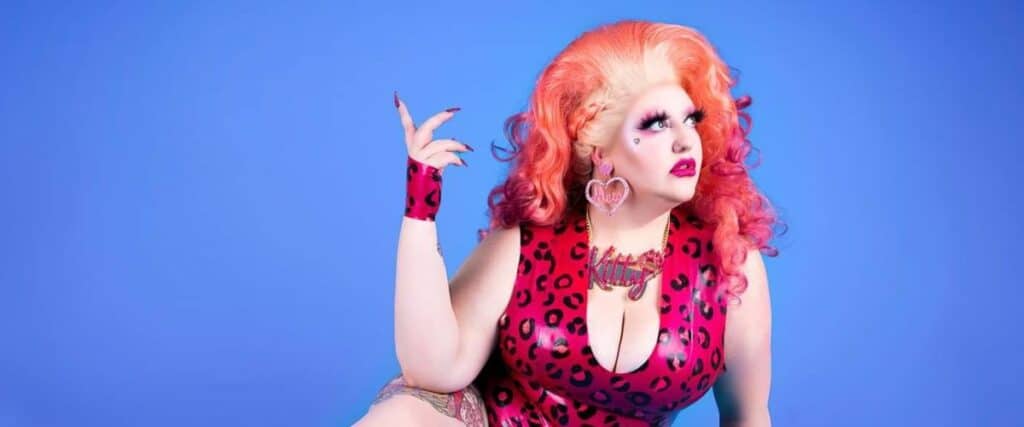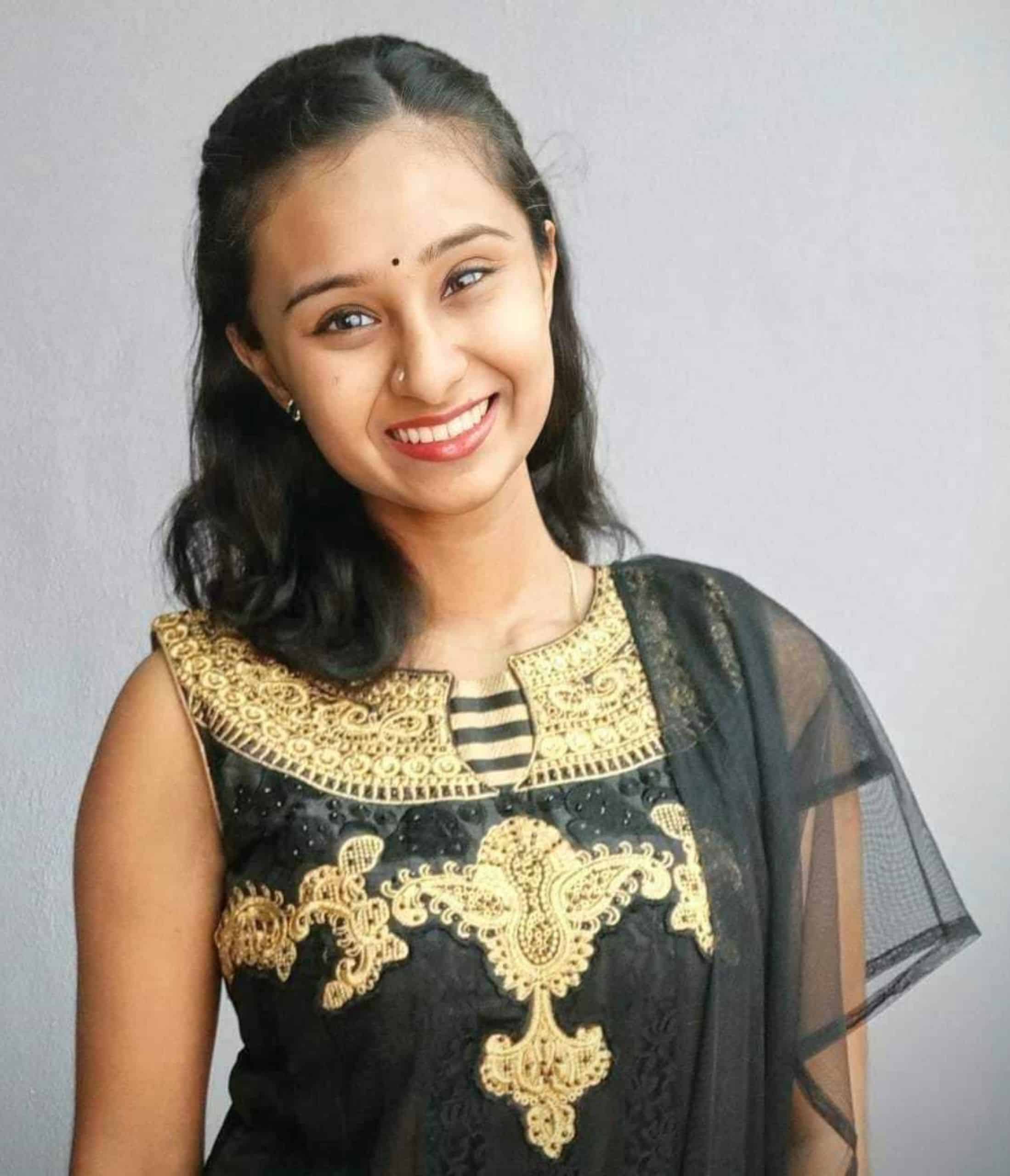In the vibrant world of drag and burlesque, where self-expression and creativity flourish, one name stands out among the rest: Kitty Obsidian. Read about how Kitty channels their passion for LGBT+ and BIPOC rights and representation, and body acceptance and diversity through their art.
Prepare to be captivated by Kitty Obsidian, a fierce and fabulous force in the world of drag and burlesque. As the Founder and Producer of Curves & Claws: Variety & Burlesque Show, as well as Obsidian Creations, Kitty channels their passion for LGBTI & BIPOC rights, representation, and body acceptance/diversity into captivating performances that captivate audiences time and time again. With a decade of experience in the limelight, Kitty continues to push boundaries and explore new forms of artistic expression, leaving a trail of wonder and awe wherever they go.
Beyond the glitz and glamour, Kitty’s involvement as a former Brisbane Leather Pride committee member showcases their dedication to creating spaces that embrace the full spectrum of human diversity. Their journey is a testament to their fierce spirit and unwavering commitment to advocating for the rights and representation of marginalised communities.
Hive Life had the privilege of sitting down with Kitty to delve into their extraordinary world, and we invite you to join us on this thrilling journey of self-discovery, empowerment, and unapologetic self-expression.
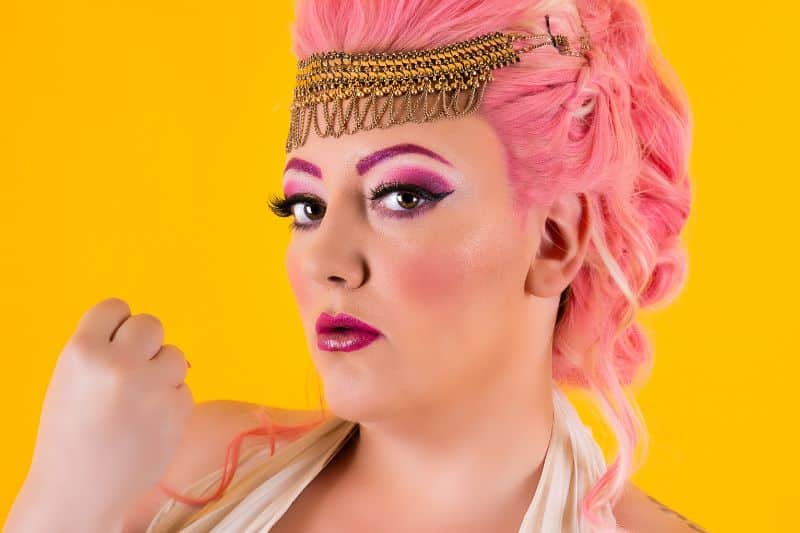
What Drives Your Passion for Artistic Exploration?
My passion for [artistic exploration] is driven by my interest in alternative art styles, shaped by my experiences as a queer non-binary person and a member of the First Nations Australian community.
[Unexpectedly], I began exploring different art forms after engaging in thought-provoking conversations with another performer about the political and challenging themes that art can address. This led me to delve into burlesque and cabaret, and now I’m focused on sideshow and drag performances, which carry political significance. Art allows me to express ideas that are often difficult to communicate, and I value the freedom it provides for such expression.
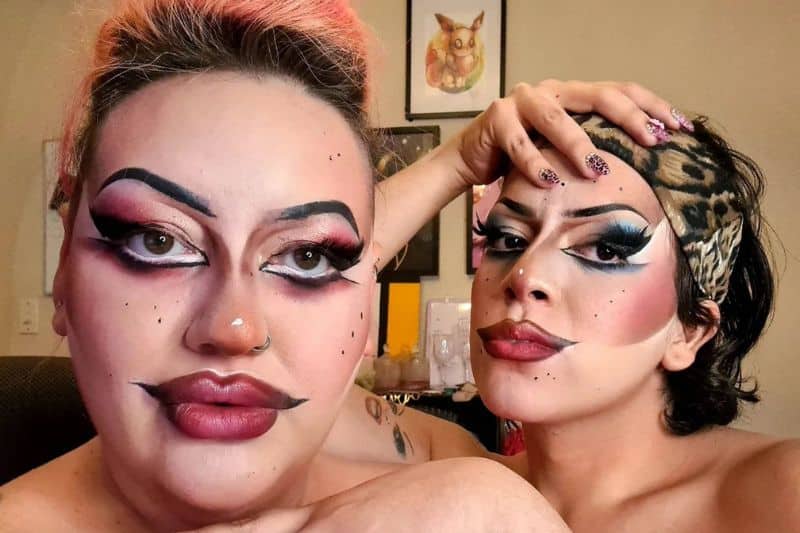
How Have Your Experiences as a Committee Member for Brisbane Leather Pride Influenced Your Artistic Journey?
As a former committee member of Brisbane Leather Pride, I have been actively involved in advocating for the rights and representation of the LGBTI and BIPOC communities. This experience has had a profound impact on my artistic journey, particularly in cabaret and Valeska drag. Although I cherished my time with Brisbane Leather Pride, I eventually moved on due to the challenges of [committee work]. Now, as a solo activist, I collaborate with grassroots organisations in Melbourne, Australia.
In my activism, I prioritise including BIPOC and queer artists in events and performances. This commitment to representation extends to every aspect of my life. Being non-binary, queer, and Aboriginal, I cannot separate my existence from politics. Regardless of the type of art I create, my political essence inevitably shines through. Through my activism, I am often invited to perform at queer events organised by councils, [providing opportunities] for educational moments where I explain the intentions behind my artistry and the artistic choices I make.

How Did You Turn Your Events Company Curves and Claws into a Successful Business Venture?
One [major hurdle] was the lack of financial resources. However, I had a clear vision [for Curves and Claws]: to create an events company that combined burlesque shows with cars and clothes while organising events for others.
I wanted to offer unique experiences missing in the industry. Initially, I struggled to secure funds, but my friend [stepped in] and encouraged me to develop a solid business plan. After a month of dedicated research, she became my investor and we worked out a repayment plan. Eventually, I bought her out and achieved complete ownership. I am [grateful] for her unwavering support throughout the journey.
Congratulations on Receiving the Top Vic NAIDOC LGBTQIA+ Pride Award in 2022! How Did it Feel to Receive Such Recognition for Your Achievements and Contributions to the Community?
[It] was a truly overwhelming experience. Throughout my life, connecting with my First Nations community has been a challenge. Relocations with my single mother and the consequences of colonisation have made it [difficult] for me to establish roots.
Discovering my heritage was daunting, as my mother was part of the stolen generation. [Research and connection] were necessary to uncover her place of origin and reconnect with her birth family.
Reintegrating into the community has been challenging due to this ongoing struggle. Despite the difficulties, this journey has motivated me to support and showcase the talents of First Nations and BIPOC individuals. Storytelling and art are vital to our identity, helping us heal from the enduring effects of colonisation. The award’s recognition overwhelmed me with emotions, as I am driven by a [sense of calling] rather than seeking recognition or financial gain.
Although working in the arts isn’t always financially rewarding, the significance of my work keeps me going.
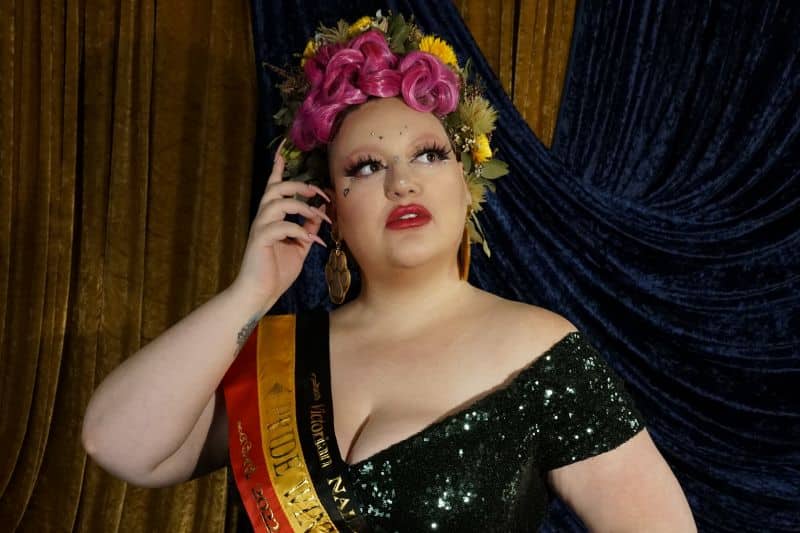
How Can the Performing Arts Contribute to a More Inclusive and Accepting Society?
Media consumption in Western societies [shapes] our perception of beauty and success. The entertainment industry has a vital role in promoting inclusivity and acceptance. Engaging with [diverse forms] of media helps us understand new perspectives, leading to changes in opinions and societal transformation.
The arts industry has long faced a class divide, with traditional art forms being associated with high costs and an upper-class audience. This lack of diversity limits representation of different races, body types, and abilities. Alternative art forms like cabarets and underground drag performances offer a [more accessible and diverse experience], showcasing marginalised groups’ talents and perspectives.
Recognising that fatphobia, racism, queerphobia, transphobia, and inaccessibility share common root causes, we can create a more inclusive society by addressing these systemic problems.
Embracing and celebrating our bodies is important, irrespective of abilities, sexual orientation, or size. Our personal journeys and expressions matter.

What Advice Do You Have for Those Interested in Performing but May be Struggling with Acceptance or Representation?
I [highly recommend] delving into the various forms of performance art to broaden your horizons and fully immerse yourself in the experience. Each style, whether it’s drag, circus, cabaret, contemporary dance, or ballet, offers a distinct outlook and a means of creative expression. Even if you don’t personally connect with a particular style, like drag, I [urge] you to attend shows and learn from them. All aspects of life on stage provide [valuable opportunities] for observation and learning.
Engage in thorough research to uncover [incredible shows] happening globally, featuring artists of all sizes and shapes who are achieving remarkable feats. By embracing the wide range of performance styles and appreciating the diversity within them, individuals can [discover] inspiration and motivation to overcome their struggles with acceptance and representation.
Do You Adapt Your Art Style When Performing in Different Venues and for Diverse Crowds?
Performing for different audiences and venues requires adapting to their expectations. For instance, when I am hired to perform as a drag artist at events like weddings or birthdays, which often cater to a wider audience, I make sure to tailor my acts accordingly to ensure appropriateness.
However, my performances still reflect an exaggerated version of my true self, as if magnifying all the qualities and aspects that define me by 150%. This portrayal remains authentic to who I am. Achieving this authenticity involves a significant amount of introspection and self-reflection, where I examine my behaviours, characteristics, and both the aspects I appreciate and dislike about myself. Through this process, I create humorous and entertaining characters that allow me to explore these facets in a lighthearted manner.
Additionally, I [place] great value on therapy, as it provides me with an unbiased outlet to discuss and maintain a grounded understanding of my true identity.
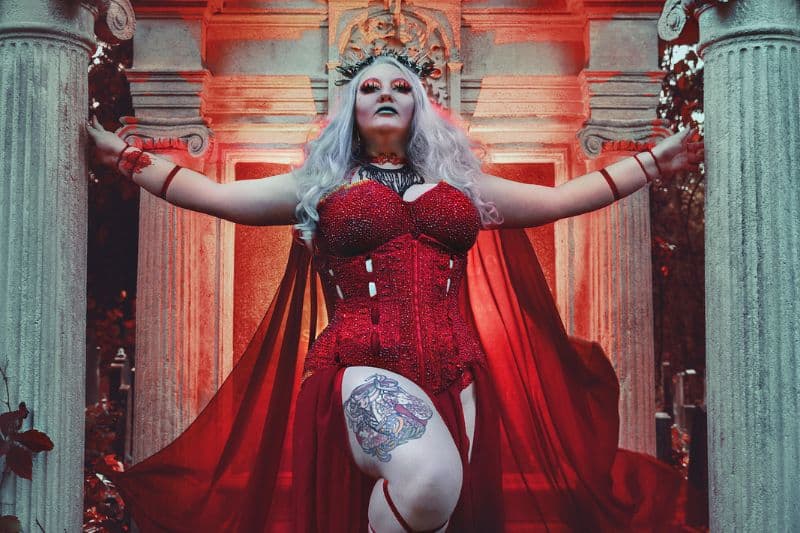
Could You Share the Story Behind the Conception of Obsidian Creations?
The tradition of pasties in burlesque has a [rich history] that influenced costumes and dance. These customs originated from America’s “blue laws,” which imposed [modesty regulations]. Pasties became mandatory in certain states, along with specific clothing and restricted movements.
Personally, I’ve always [loved] shiny things and enjoyed crafting, so I started creating pasties with rhinestones. When COVID-19 hit and Melbourne went into lockdown, I [found solace] in making pasties and rhinestone costumes.
Eventually, I turned it into a business called Obsidian Creations. I now sell my pasties and offer rhinestoning services [at schools] and for individuals attending festivals. Obsidian Creations also sponsors a local drag competition, supporting the vibrant community I serve.
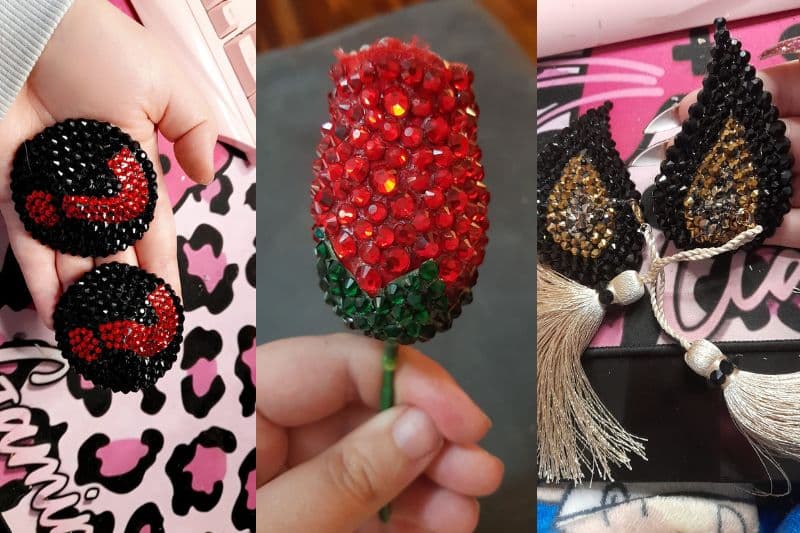
What Have Been Your Proudest Achievements So Far as an Entrepreneur?
Winning the NAIDOC Award stands as one of my proudest accomplishments. This was a remarkable feat considering the nature of my work. Another memorable milestone was the completion of one of my largest shows, which not only sold out but exceeded standing room capacity. An unforgettable moment came when a lady in her mid-30s approached me after the show, expressing how it made her realise her own beauty. This [transformative] experience reinforced my passion for positively impacting others’ lives.
[Moreover], I was offered spots in international festivals for a tour across Europe, performing in nine countries. Being the first Australian Aboriginal person to perform in these spaces brought immense pride and the opportunity to represent my culture on a global stage. These achievements have deeply influenced my career, fueling my motivation to continue making a difference through my work.
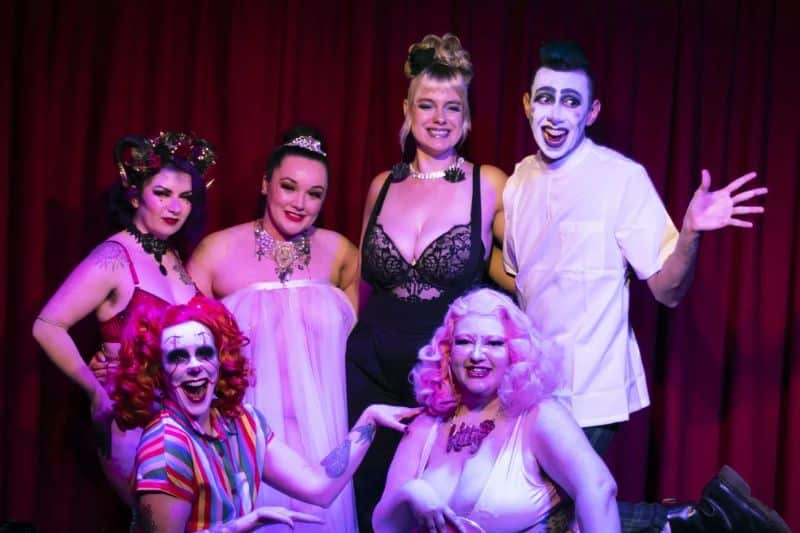
Can You Share Some Practical Steps Individuals Can Take to Create a More Inclusive and Welcoming Environment For All on a Day-to-Day Basis?
[To] promote inclusivity and respect for others, it’s important to include your pronouns in everyday interactions, like your email signature, and ask for others’ pronouns rather than assuming. Stay informed about evolving social dynamics and language to avoid unintentional harm. You can easily educate yourself by spending a small amount of time researching on platforms like TikTok, podcasts, and social media groups.
Being politically engaged is crucial to protect the rights of marginalised communities, including LGBTQ+ individuals. [Advocate] for human rights and combat misinformation and ignorance through education. [Utilise] the internet to gather information and make a difference in creating a compassionate society that respects everyone’s rights, not just during Pride Month.
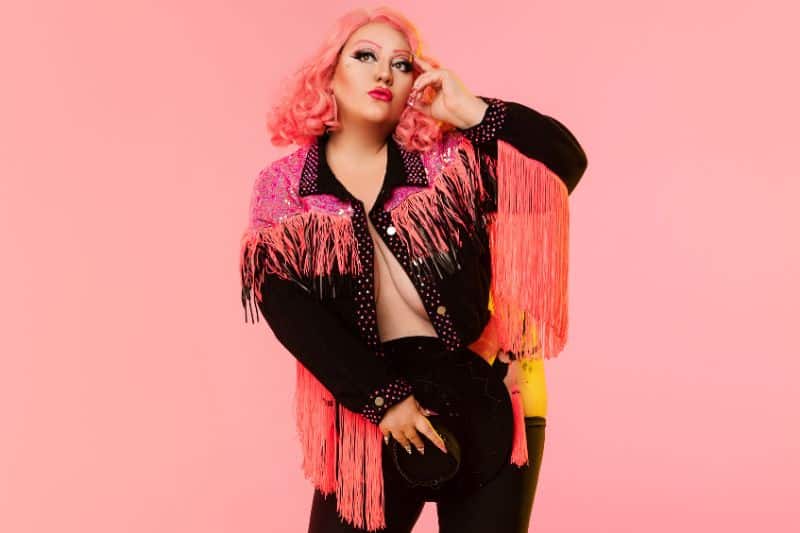
Looking Ahead, What are Your Aspirations and Goals for the Future? Are There Any Upcoming Projects or Collaborations That You are Particularly Excited About?
One of the things I’m [honoured] about is being the resident emcee for the Legacy competition. It’s a new drag competition that connects aspiring drag artists with mentors, fostering connections and providing education. Many artists have to figure things out on their own, so pairing them with industry professionals gives them the chance to learn from the best, including award-winning individuals. As the emcee, I’ll be conducting a workshop on the business side of performing, teaching contestants skills like invoicing and obtaining insurance.
I’m also involved in the Australian Burlesque Festival as a featured artist for their touring shows and a producer for the exciting Blaze Out event. Blaze Out showcases BIPOC performances for the community and celebrates the diverse talent in Australia.
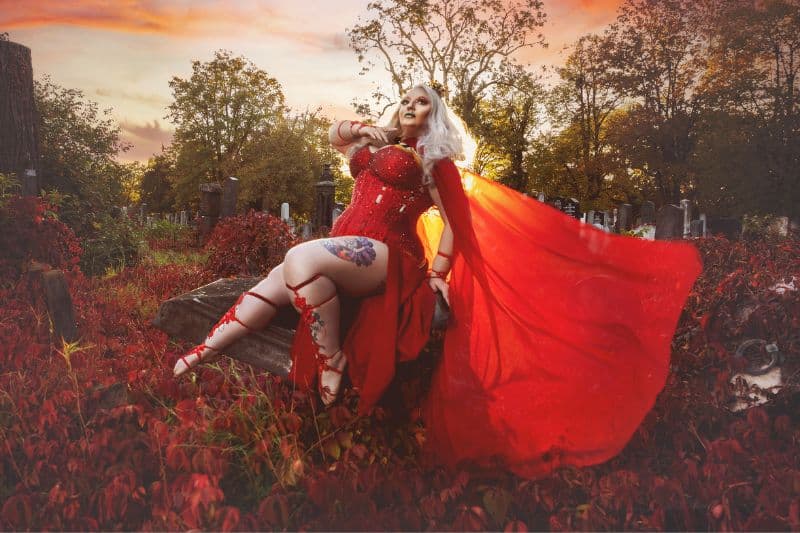
Featured banner image credit: @MissKittyObsidian
Related Articles
Darien Chen: Heralding the Pride Movement in Taiwan, Asia, and the World
Proud and Powerful: 7 Queer-Owned Businesses in APAC to Support
CSR Guide: How to Foster a Sustainable Diversity and Inclusion Strategy at Your Workplace
